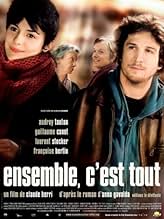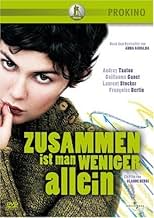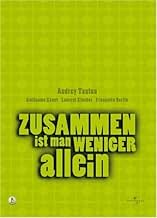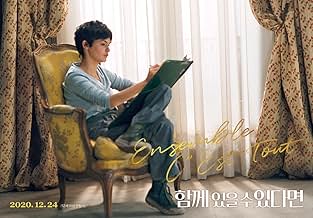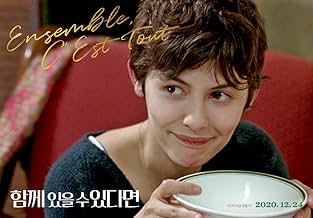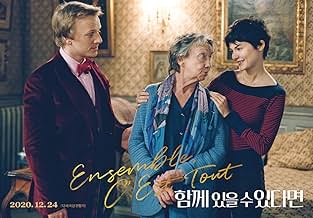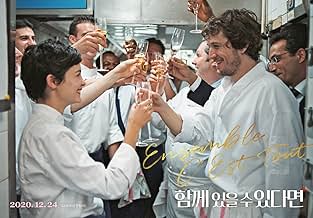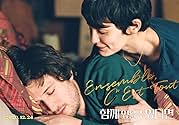IMDb रेटिंग
6.7/10
13 हज़ार
आपकी रेटिंग
अपनी भाषा में प्लॉट जोड़ेंWhen Camille (Audrey Tautou) falls ill, she is forced to live with Philibert and Franck (Guillaume Canet). A moving trio story.When Camille (Audrey Tautou) falls ill, she is forced to live with Philibert and Franck (Guillaume Canet). A moving trio story.When Camille (Audrey Tautou) falls ill, she is forced to live with Philibert and Franck (Guillaume Canet). A moving trio story.
- पुरस्कार
- 3 जीत और कुल 5 नामांकन
Béatrice Michel
- Carine
- (as Beatrice Michel)
Hélène Surgère
- Yvonne
- (as Helene Surgere)
Danièle Lebrun
- Mère de Camille
- (as Daniele Lebrun)
Sandrine Mazéas
- Sandrine
- (as Sandrine Mazeas)
फ़ीचर्ड समीक्षाएं
"Hunting and Gathering" is the penultimate film of Claude Berri, the last tycoon of French cinema. He passed away before completing his final project but I like to think of that one as the last one made under his full artistic supervision because it's a fitting ending to a rich body of work and the subject poetically closes an arc traced by his first feature film "The Old Man and the Child" with Michel Simon...
There truly is a poignant and satisfying feeling of full circle with the theme of people who overcome isolation and find a ray of sunshine in their lives through the presence of others. It's as simple as that but sometimes it's within the simplicity of moments such as people sharing a meal, a drink, a conversation that faith in happiness can be revived. The film might never leave a indelible impression, it's not on par with Claude Berri's celebrated works such as "So Long, Stooge", or "Jean de Florette/ Manon des Sources" but it does leave the viewer with with a little smile in your face and a great deal of satisfaction.
There are four protagonists, all wonderfully played by their respective actors, I did believe in each of them though I must admit I had a hard time sympathizing with Guillaume Canet's Franck who plays the bad boy with a golden heart. It's not his performance but rather the way he was perhaps the most "obvious" of all. He's a young chef who takes care of his grandmother Paulette (Françoise Bertin) a woman in her eighties and whose declining health put her in a retirement home, far from her little house, her garden and her cats. Oh I'm digressing, I was talking about Franck. The offspring of a failed union, left by both his parents and raised by Paulette, he built a defensive hard-to-get attitude to preserve himself from deception and drowns his bitterness in beer and one-night stands... life for his meals, love is one thing to make, not enjoy.
Franck isn't the only one with demons, there's Camille played by Audrey Tautou. She doesn't see eye to eye with her mother and works as a janitorial worker, she's anorexic, smokes a lot and lives in one of these studios in the top of Parisian buildings (called 'maid's rooms' die to their extreme coziness. She's got nerves, a dry sense of humor and doesn't strike as the girl who believes in a Charming Prince but she knows good person when she sees one. An office worker leaves some of his garbage outside the basket, she leaves a savage note on his office, a kindly neighbor, Philibert (Laurent Stocker) addresses her politely, she just invites him to a little improvised dinner in her room. Why? Maybe because unlike Franck, she can't force herself to believe that she can live without a good company every now and then. And unlike Franck, it's not sexual and somehow she felt that Philibert wouldn't think so either.
Philibert is a man with aristocratic background written all over his particle name, he has a stammer, wears a shapka and dresses like a dandy from the 50s, whatever made him the roommate of Franck might be the only "plot convenience" we could close our eyes on... Anyway, it all leads down to a night where Camille falls sick and Philibert takes her to her apartment, she needs a few day to recover and eventually meet Franck. Now. I still remember my initial feeling, I was so moved by the duo formed by Camille and Philibert that I felt like the film would lose its mindless charm if it had to surrender the something as formulaic as "boy meets girl - they hate each other - they fall in love" etc.
Well, it's a foregone conclusion that the two will fall in love but Berri's film doesn't care about clichés as much as it doesn't care about avoiding them . And no matter what, the film is less about two people who found love, than four people who found a certain state of grace once they opened their doors and therefore their hearts to each other... Philibert overcomes his handicap and pursue theater courses and finds love on stage... Paulette is hosted by her grandson and taken care of by Camille... and Camille and Franck, tease each other, resist the idea of falling in love to better throw themselves in. But again, love is less a plot device than a collateral healing.
We know that some facts of life will take their rights back but there's never a sense of major threat or some existential obstacle, it's just as if Berri knowing each film could be the last decided to free himself from that 'need of social relevance' like in his earlier movies ... We live in a world that is a constant temptation for isolation and cynicism and that the very director of "So Long, Stooge" with Coluche, could compose that hymn for togetherness can almost look utopian or naïve, but if such scenarios were that implausible, would the world really be worth to live?
Why couldn't an old woman die peacefully in the place she loved? Why would a man with a stutter not become an acclaimed comedian? Why wouldn't professional success be compatible with true love? In "The Old Man and the Sun", an old prejudiced man hid a little Jewish boy. He didn't know about his identity but it didn't matter, the kid became his best friend and the old man's soul was cleaned up. The stakes are lower in "Hunting and Gathering", no life-and-death situation, but the spirit is the same: maybe one of the key to happiness is to meet people who make us want to become better.
There truly is a poignant and satisfying feeling of full circle with the theme of people who overcome isolation and find a ray of sunshine in their lives through the presence of others. It's as simple as that but sometimes it's within the simplicity of moments such as people sharing a meal, a drink, a conversation that faith in happiness can be revived. The film might never leave a indelible impression, it's not on par with Claude Berri's celebrated works such as "So Long, Stooge", or "Jean de Florette/ Manon des Sources" but it does leave the viewer with with a little smile in your face and a great deal of satisfaction.
There are four protagonists, all wonderfully played by their respective actors, I did believe in each of them though I must admit I had a hard time sympathizing with Guillaume Canet's Franck who plays the bad boy with a golden heart. It's not his performance but rather the way he was perhaps the most "obvious" of all. He's a young chef who takes care of his grandmother Paulette (Françoise Bertin) a woman in her eighties and whose declining health put her in a retirement home, far from her little house, her garden and her cats. Oh I'm digressing, I was talking about Franck. The offspring of a failed union, left by both his parents and raised by Paulette, he built a defensive hard-to-get attitude to preserve himself from deception and drowns his bitterness in beer and one-night stands... life for his meals, love is one thing to make, not enjoy.
Franck isn't the only one with demons, there's Camille played by Audrey Tautou. She doesn't see eye to eye with her mother and works as a janitorial worker, she's anorexic, smokes a lot and lives in one of these studios in the top of Parisian buildings (called 'maid's rooms' die to their extreme coziness. She's got nerves, a dry sense of humor and doesn't strike as the girl who believes in a Charming Prince but she knows good person when she sees one. An office worker leaves some of his garbage outside the basket, she leaves a savage note on his office, a kindly neighbor, Philibert (Laurent Stocker) addresses her politely, she just invites him to a little improvised dinner in her room. Why? Maybe because unlike Franck, she can't force herself to believe that she can live without a good company every now and then. And unlike Franck, it's not sexual and somehow she felt that Philibert wouldn't think so either.
Philibert is a man with aristocratic background written all over his particle name, he has a stammer, wears a shapka and dresses like a dandy from the 50s, whatever made him the roommate of Franck might be the only "plot convenience" we could close our eyes on... Anyway, it all leads down to a night where Camille falls sick and Philibert takes her to her apartment, she needs a few day to recover and eventually meet Franck. Now. I still remember my initial feeling, I was so moved by the duo formed by Camille and Philibert that I felt like the film would lose its mindless charm if it had to surrender the something as formulaic as "boy meets girl - they hate each other - they fall in love" etc.
Well, it's a foregone conclusion that the two will fall in love but Berri's film doesn't care about clichés as much as it doesn't care about avoiding them . And no matter what, the film is less about two people who found love, than four people who found a certain state of grace once they opened their doors and therefore their hearts to each other... Philibert overcomes his handicap and pursue theater courses and finds love on stage... Paulette is hosted by her grandson and taken care of by Camille... and Camille and Franck, tease each other, resist the idea of falling in love to better throw themselves in. But again, love is less a plot device than a collateral healing.
We know that some facts of life will take their rights back but there's never a sense of major threat or some existential obstacle, it's just as if Berri knowing each film could be the last decided to free himself from that 'need of social relevance' like in his earlier movies ... We live in a world that is a constant temptation for isolation and cynicism and that the very director of "So Long, Stooge" with Coluche, could compose that hymn for togetherness can almost look utopian or naïve, but if such scenarios were that implausible, would the world really be worth to live?
Why couldn't an old woman die peacefully in the place she loved? Why would a man with a stutter not become an acclaimed comedian? Why wouldn't professional success be compatible with true love? In "The Old Man and the Sun", an old prejudiced man hid a little Jewish boy. He didn't know about his identity but it didn't matter, the kid became his best friend and the old man's soul was cleaned up. The stakes are lower in "Hunting and Gathering", no life-and-death situation, but the spirit is the same: maybe one of the key to happiness is to meet people who make us want to become better.
What a pleasant surprise this film turned out to be! After about 25 mins, i was totally hooked into this quartet of terrific, subtly drawn characters. What could have been a fairly stock- standard, 'everyone-comes-together-in-Paris' type of comedy-drama, is elevated by great performances (the always gorgeous Audrey Tautou and the impressive Guilliame Canet in particular), considered production design & a script that doesn't take the easy way out and continually defies your expectations.
Wholly charming, this is a great romantic fable, hugely fun, and should appeal to anyone who wants a thoughtful yet enjoyable trip to the cinema.
Wholly charming, this is a great romantic fable, hugely fun, and should appeal to anyone who wants a thoughtful yet enjoyable trip to the cinema.
From beginning to end, I thoroughly enjoyed this movie. Every member of the cast was excellent but I particularly loved Guillaume Canet. I first saw him in Jeux d'enfants and fell in love with him (who wouldn't?). As for Audrey Tautou, I finally saw what all the fuss was about. I have seen Le Fabuleux destin d'Amélie Poulain, but I didn't care for it at all.
I only wish that this film had been longer so that we could have been better acquainted with Philibert since he was such an interesting character.
I also loved Françoise Bertin's performance as it was very touching. I identified with the struggle that many of us face in trying to care for someone and trying to earn a living.
All in all, a very commendable film.
I only wish that this film had been longer so that we could have been better acquainted with Philibert since he was such an interesting character.
I also loved Françoise Bertin's performance as it was very touching. I identified with the struggle that many of us face in trying to care for someone and trying to earn a living.
All in all, a very commendable film.
I have just seen the movie in Sydney and enjoyed it very much. My last movie was "conversation with a gardener" which I enjoyed equally. I was French for 27 years and movies that can bring me back to what I missed the most are indeed pleasing. Not that I could really identify with any of the characters but simply their actions and the settings in which they happened brought back vivid memories. One can philosophy as much as one wishes to. But I feel actors very heart of their vocation is to make the audience enjoy the reality of their acting. And this reality will affect any normal sophisticated or unsophisticated person if that person is not too busy playing the critic or demanding a particular agenda. Our life experience is something we can't deny, no matter whom we may be. So these 3 then 4 characters are just doing that following their dreams in a too human way, and the only way they know how to do it. I'm not too well versed in directors trends or particular project, I just manage to retain some actors'name, Tatou is now one of them, yet it's her characters that interests me. I'm simply feeling good, bad or indifferent with movies. Just like wine, I don't drink label, but hope to enjoy the taste. Why "Hunting and Gathering"? I certainly understand better "Ensemble, C'est tout". Am I missing something here? Just the same I'll have to agree - togetherness, even if a pain at times, is yet preferable to loneliness.
It's Audrey Tautou, and ever since Amelie, I am of the opinion that Singaporeans have an affinity for the pint sized actress, and her box office draw here is fairly strong. Count me in as one of the fans who will lap up her cinematic outings, good or bad, so long as our heroine gets the opportunity to shine on screen.
Hunting and Gathering is based on a novel by Anna Gavalda, and tells the story of four individuals whose lives converge in an apartment. In this movie directed by Claude Berri, I thought that it was split into 3 acts, with story arcs focused on the challenges faced by each of the characters. Tautou stars as Camille Fauque, a near anorexic surface engineer who smokes a lot, guzzles alcohol, but eats very little. Living alone in a small attic of an apartment block, she meets Philibert (Laurent Stocker), a fellow neighbour who suffers from bouts of anxiety. Philibert's housemate Franck (Guillaume Canet) is a chef who lives hard and fast, whose only worry is the welfare of his grandmother Paulette (Francoise Bertin), a senior citizen who fears being tossed aside by kin, and makes life quite difficult for her caretakers.
The narrative is quite plain actually, with every conceivable development being very predictable. That means no quirky twists and turns for the sake of it, and it actually allows you to shift to lower gears to enjoy this outing. It's a story about having dreams, fulfilling them, and helping others to fulfill theirs too, through encouragement and support rendered. Having all four characters together under one roof, though brief it might be, did seem like an episode of Friends gone all French and all whacked with the age grouping, and proving correct the adage that two's a company and three's a crowd.
It did try to cover a lot of ground given that there are a number of characters here, but it did so at the expense of depth. The romance entanglements between characters did seem rather superficial, bland, trivial and predictable, while Philibert's quest to stem out his stammering through stage acting unfortunately had to take the backseat, and thus having his character fade away somewhat for the last act of the movie. The most meaningful and beautiful arc here belongs to Francoise Bertin's Paulette, as her tale of fear of abandonment rings through very honestly, and somehow, you'll start to wonder when you're of old age, whether you will have companions whom you can get along with, or be forgotten and tossed to some old folks' home to spend your twilight years in. I felt that it was superiorly poignant, without which there would be no emotional anchor for this movie.
Somehow, movies that feature food and classy restaurants (Ratatouille, Mostly Martha and No Reservations anyone?) of late that I've watched always have fallen into the clichéd ending. I'm unsure if it's an unwritten rule to have it done so, or if it's a formula that has proved to work every time. But in all earnestness, I thought it ended quite nicely with that happily ever after feel. In summary, definitely worth a watch for the eye candy cast, but it plays like a generic romantic / friendship tale that possesses potential that was hardly scratched.
Hunting and Gathering is based on a novel by Anna Gavalda, and tells the story of four individuals whose lives converge in an apartment. In this movie directed by Claude Berri, I thought that it was split into 3 acts, with story arcs focused on the challenges faced by each of the characters. Tautou stars as Camille Fauque, a near anorexic surface engineer who smokes a lot, guzzles alcohol, but eats very little. Living alone in a small attic of an apartment block, she meets Philibert (Laurent Stocker), a fellow neighbour who suffers from bouts of anxiety. Philibert's housemate Franck (Guillaume Canet) is a chef who lives hard and fast, whose only worry is the welfare of his grandmother Paulette (Francoise Bertin), a senior citizen who fears being tossed aside by kin, and makes life quite difficult for her caretakers.
The narrative is quite plain actually, with every conceivable development being very predictable. That means no quirky twists and turns for the sake of it, and it actually allows you to shift to lower gears to enjoy this outing. It's a story about having dreams, fulfilling them, and helping others to fulfill theirs too, through encouragement and support rendered. Having all four characters together under one roof, though brief it might be, did seem like an episode of Friends gone all French and all whacked with the age grouping, and proving correct the adage that two's a company and three's a crowd.
It did try to cover a lot of ground given that there are a number of characters here, but it did so at the expense of depth. The romance entanglements between characters did seem rather superficial, bland, trivial and predictable, while Philibert's quest to stem out his stammering through stage acting unfortunately had to take the backseat, and thus having his character fade away somewhat for the last act of the movie. The most meaningful and beautiful arc here belongs to Francoise Bertin's Paulette, as her tale of fear of abandonment rings through very honestly, and somehow, you'll start to wonder when you're of old age, whether you will have companions whom you can get along with, or be forgotten and tossed to some old folks' home to spend your twilight years in. I felt that it was superiorly poignant, without which there would be no emotional anchor for this movie.
Somehow, movies that feature food and classy restaurants (Ratatouille, Mostly Martha and No Reservations anyone?) of late that I've watched always have fallen into the clichéd ending. I'm unsure if it's an unwritten rule to have it done so, or if it's a formula that has proved to work every time. But in all earnestness, I thought it ended quite nicely with that happily ever after feel. In summary, definitely worth a watch for the eye candy cast, but it plays like a generic romantic / friendship tale that possesses potential that was hardly scratched.
क्या आपको पता है
- ट्रिवियाCharlotte Gainsbourg was originally cast as Camille.
- इसके अलावा अन्य वर्जनThere are two different versions, although the runtimes are the same: "1h 37m (97 min)" and "1h 37m (97 min) (European Film Market) (Germany)".
टॉप पसंद
रेटिंग देने के लिए साइन-इन करें और वैयक्तिकृत सुझावों के लिए वॉचलिस्ट करें
- How long is Hunting and Gathering?Alexa द्वारा संचालित
विवरण
बॉक्स ऑफ़िस
- दुनिया भर में सकल
- $3,19,27,276
- चलने की अवधि1 घंटा 37 मिनट
- रंग
- ध्वनि मिश्रण
- पक्ष अनुपात
- 1.85 : 1
इस पेज में योगदान दें
किसी बदलाव का सुझाव दें या अनुपलब्ध कॉन्टेंट जोड़ें



